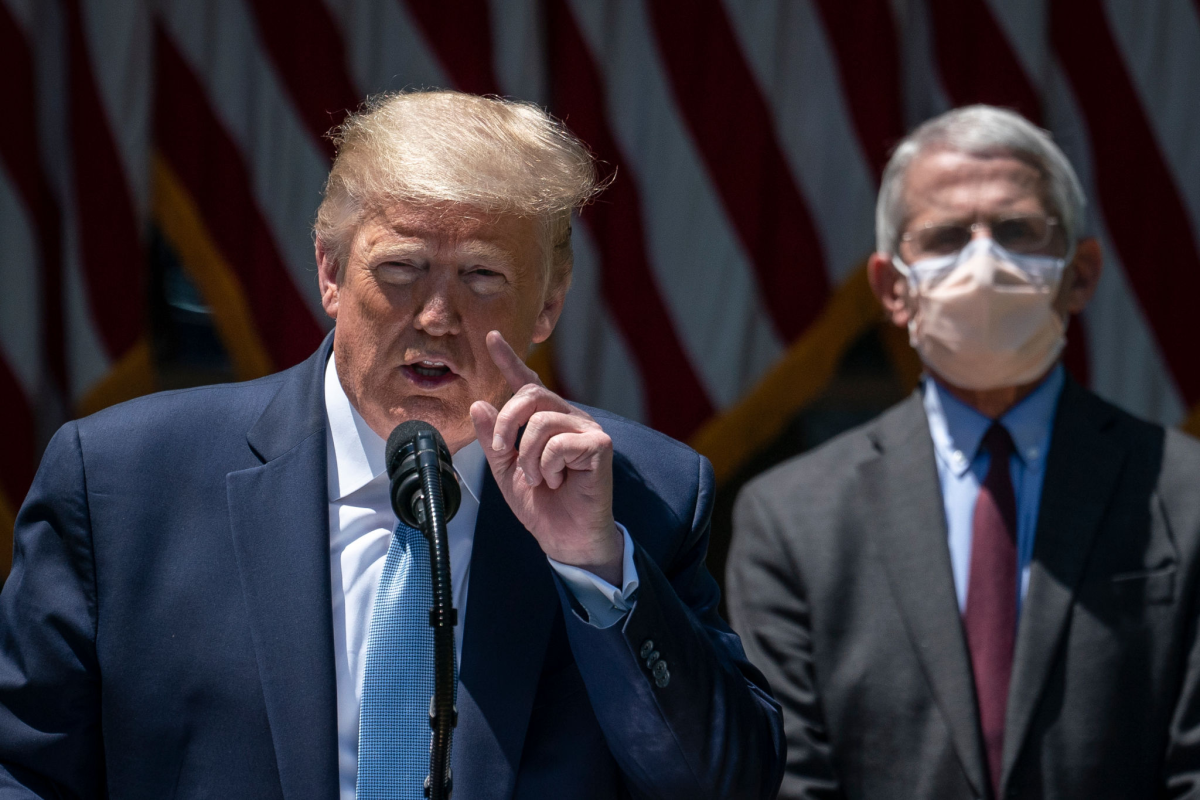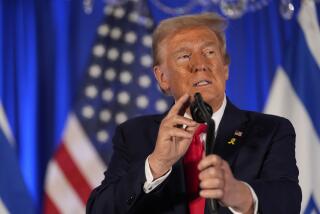Column: In 9 hours and 18 interviews, Trump shows he cares only about Trump

WASHINGTON — To the ancient Greeks, hubris was the crime of arrogance — an offense against common decency and an insult to the gods.
Their myths included a goddess named Nemesis whose job was to punish the prideful. She lured Narcissus, vainest of men, to a pool where he fell in love with his reflection and drowned.
No character in myth ever tempted Nemesis as ardently as President Trump courted Bob Woodward, journalism’s longtime humbler of presidents.
In 18 conversations spanning more than nine hours since December, Trump welcomed Woodward into the White House and called him on the telephone, often late at night.
In the race between Joe Biden and Donald Trump, almost nothing changes, regardless of the week’s headlines. Surprised? Don’t be.
And what did the president reap for his attentions? The most comprehensive and damning catalog yet of his failings in office, arriving in bookstores only seven weeks before election day.
Nemesis would be amused.
The big revelation in Woodward’s new book, “Rage,” is that when Trump told Americans the COVID-19 pandemic was no worse than a bad flu season, he knew the disease was much worse. He told Woodward it was “deadly,” “a horrible thing.”
“I wanted always to play it down,” he told the reporter.
That shouldn’t have come as news to anyone who was listening to the president with a sliver of healthy skepticism.
In the pandemic’s early weeks, there was genuine debate among experts on how infectious the coronavirus was. But by mid-March, even Trump agreed to shut down much of the nation’s economy to stop the virus’ spread.
Then, for months, he waffled publicly between treating the pandemic as an emergency and claiming it would soon disappear. “Stay calm,” he pleaded whenever the stock market fell, a problem that seemed to worry him more than mounting deaths.
The president became a slave to his own wishful thinking, promoting spurious cures and never doing the hard work of organizing a national effort to provide medical supplies, tests or contact tracing.
“He wants to be a wartime president,” his golfing buddy and advisor Sen. Lindsey Graham (R-S.C.) told Woodward, “but he doesn’t want to own any more than he has to.”
But again, all that happened in plain view. The real impact of Woodward’s reporting probably comes from the audiotapes of his interviews.
“This is deadly stuff,” Trump said, his voice booming clearly over the telephone Feb. 7, “more deadly than even your strenuous flus.”
The tape makes Woodward’s reporting bulletproof. Those words aren’t notebook jottings or the secondhand account of a disgruntled aide. It’s the president himself in all his blustery hubris.
Even the most credulous MAGA militant can’t claim that Trump is being misquoted here. The only defense Trump has offered is that when he downplayed the virus’ danger, he was lying in the public interest, because he didn’t want to create panic.
It’s a puerile defense; real leaders tell the public unwelcome truths without causing hysteria.
The tapes also make Trump’s betrayal of his own supporters — he urged his maskless followers to attend crowded rallies even though he knew the virus was transmitted through the air — more visceral, much as the Watergate tapes of President Nixon did in 1974.
Hearing the president breezily insist that he’s done “a very good job” despite a national death toll that will soon pass 200,000 is like a punch in the stomach.
But there’s more to “Rage” than its detailed narrative of Trump’s failure on the coronavirus. The book also includes a catalog of damning assessments from people who once worked for the president — and a few who still do.
“He’s dangerous. He’s unfit,” then-Defense Secretary James N. Mattis is said to have told Dan Coats, Trump’s first director of national intelligence.
“He doesn’t know the difference between the truth and a lie,” Coats says.
“His attention span is like a negative number,” Woodward quotes Dr. Anthony Fauci of the National Institutes of Health as saying. “His sole purpose is to get reelected.”
Even Jared Kushner, Trump’s loyal son-in-law, recognizes the president’s flaws. Woodward quotes him as praising a Wall Street Journal column that calls Trump “crazy” and paints his White House as hobbled by “epic instability, mismanagement and confusion.”
There’s a legitimate argument whether Woodward should have published his interviews with Trump earlier. Critics have argued that if Americans had known earlier what the reporter had heard, thousands of lives might have been saved.
But the complaint is exaggerated. Woodward says it took him until May to unravel the details of what Trump knew and when. By then, the president’s failure to lead on COVID-19 was already obvious.
And there’s no reason to believe a stinging newspaper article would have prompted Trump to change course. He views the press as his sworn enemy.
Indeed, he’s still at it. This month, the president told Americans that “we’re rounding the corner” on the pandemic even as some researchers warned the already staggering death toll could double in months.
Fauci bluntly disagreed with Trump’s claim, telling MSNBC that even if a vaccine is developed this year, life may not return to normal until “well into 2021,” and possibly later.
At several points in Woodward’s account, Graham and others warn Trump that his biggest opponent isn’t Joe Biden or some other Democrat. It’s the coronavirus.
But the president is also running against himself. As any student of Greek tragedy could tell him, if he fails to win reelection it will be his own flaws that bring him down — beginning with hubris.
More to Read
Get the L.A. Times Politics newsletter
Deeply reported insights into legislation, politics and policy from Sacramento, Washington and beyond. In your inbox three times per week.
You may occasionally receive promotional content from the Los Angeles Times.











